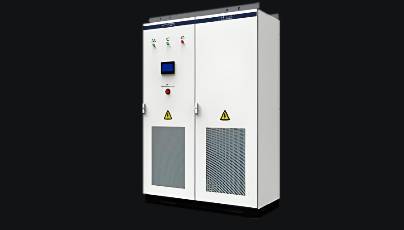Share to
An inverter is a type of power conversion device, whose core function is to convert direct current into alternating current. In
energy storage system, the role of inverters is particularly important. It is responsible for converting stored DC electricity into AC electricity to meet various load requirements. At the same time, the inverter can also control the input and output of energy, ensuring the safe and reliable operation of the system. Usually, inverters are used in conjunction with battery packs or capacitors to achieve energy storage and conversion. In energy storage systems, inverters play several important roles:
1. Energy conversion: Energy storage devices usually store DC energy, while the power grid requires AC energy. Inverters can convert the stored DC energy into the required AC energy, achieving the conversion and output of electrical energy.
2. Control output voltage: The inverter can control the voltage, frequency, and waveform of the output AC power to adapt to different application scenarios and load requirements, ensuring the stability and reliability of the output electrical energy.
3. Connected to the power grid: The inverter can connect the energy storage system to the power grid, achieving bidirectional flow of electrical energy, participating in grid frequency regulation, peak shaving and valley filling activities, and improving grid stability and economy.
4. Control system operation: The inverter can monitor and control the flow of electrical energy in the energy storage system, ensuring the normal operation of the system, while achieving real-time monitoring and adjustment of the system.

In addition to energy storage systems, the conversion capability of inverters makes them widely used in multiple other fields. Here are some specific application scenarios:
1. New energy generation: In solar and wind power generation systems, inverters can convert the direct current generated by solar panels and wind turbines into alternating current, which can be integrated into the grid or supplied to the load for use.
2. In the field of electric vehicles, inverters can convert the direct current provided by car batteries or solar panels into alternating current for use in on-board appliances, such as laptops, phone chargers, and power tools.
3. In the field of rail transit: In the traction system of electric locomotives, inverters are used to convert the electrical energy from the DC power grid into AC power, which is supplied to the traction motors.
4. In the field of communication systems, inverters provide uninterrupted AC power supply for communication base stations, microwave relay stations, satellite ground stations, and other facilities, ensuring the stable operation of communication systems.
5. Industrial and civilian fields: In industrial production, inverters are also commonly used for energy conversion, control, and other aspects to meet different production needs. Inverters are widely used in industries such as power, metallurgy, petrochemicals, mining, and construction, providing the necessary AC power supply for loads such as electric motors, lighting, and electric heaters. In terms of civilian use, inverters can be used in various places that require AC power, such as homes, schools, hospitals, shopping malls, etc.
When operating the inverter, users need to follow certain steps, including connecting the power supply, connecting the device, turning on the inverter, and constantly monitoring the status of the inverter during use. In addition, maintenance and upkeep of inverters are also key to ensuring their long-term stable operation.
Inverters play a crucial role in energy storage systems, not only enabling the conversion and output of electrical energy, but also helping to achieve intelligent control and monitoring of the system. Meanwhile, inverters are also widely used in fields such as solar photovoltaic systems, wind power generation systems, and electric vehicle charging. Inverters are one of the indispensable key equipment in modern power systems. With the continuous progress of technology and the development of new energy, the application scenarios of inverters will be further expanded.

